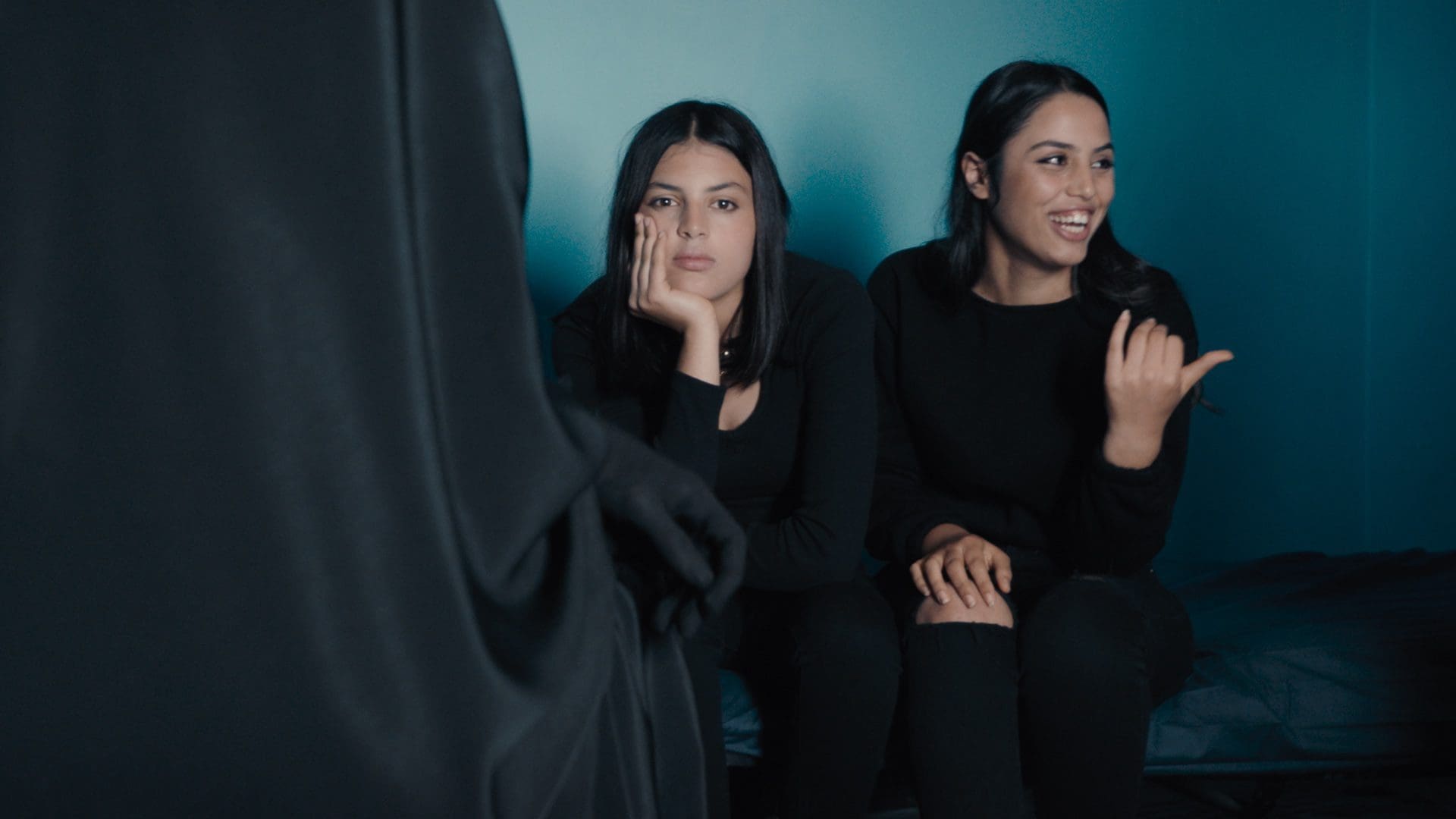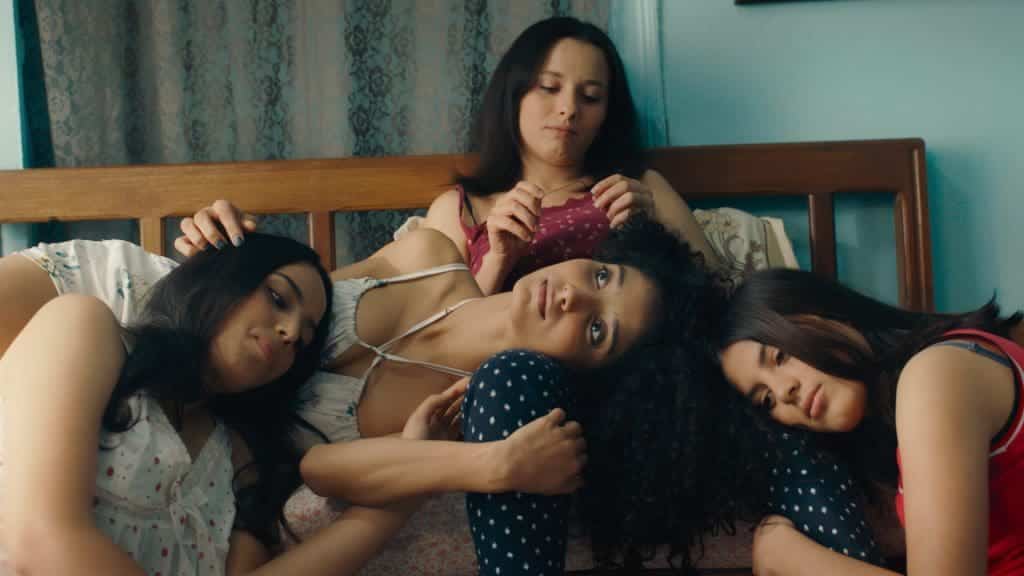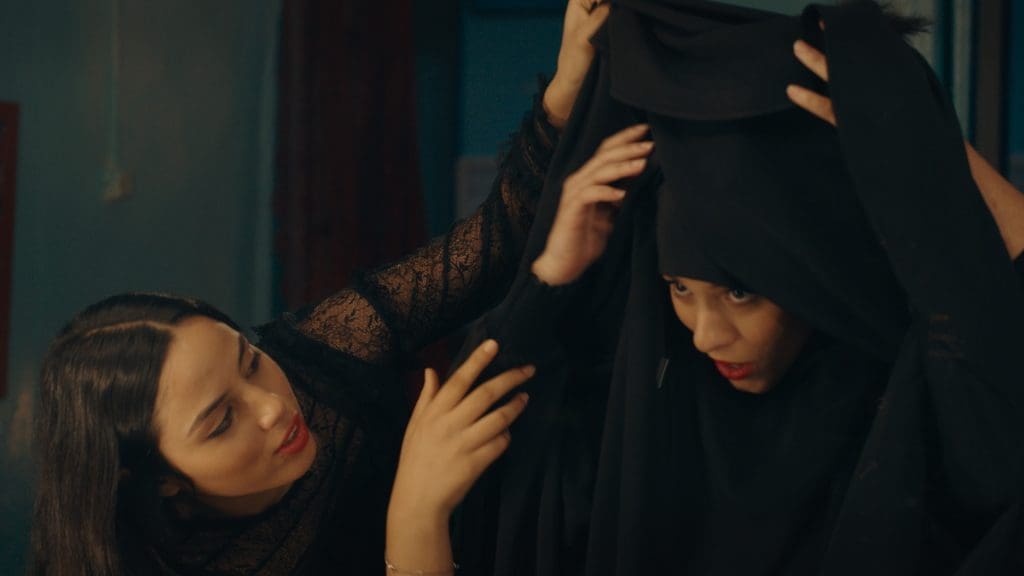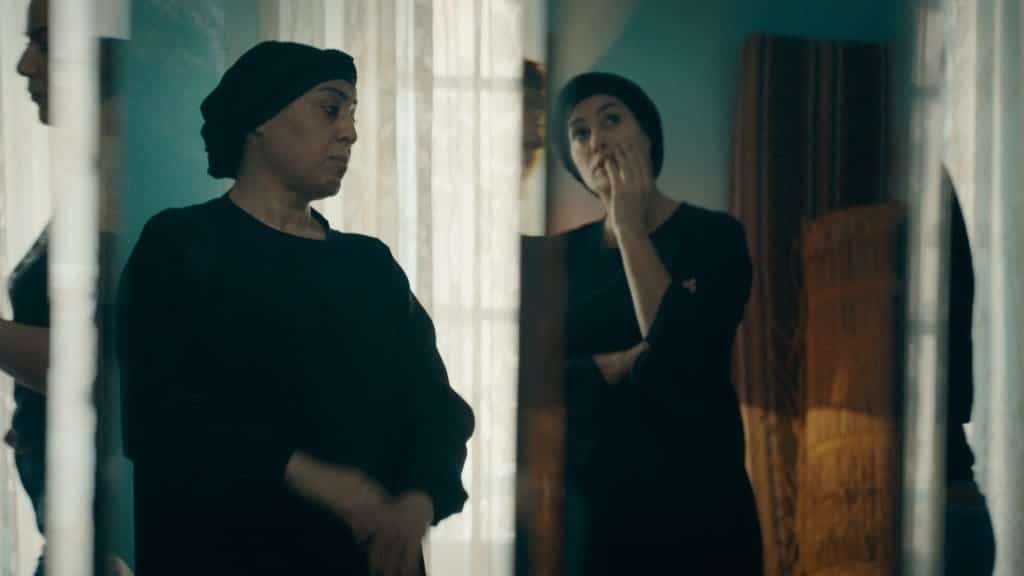
There’s a scene in Kaouther Ben Hania’s Four Daughters—an affecting new picture unpacking family trauma and, nominated for Best Documentary Feature at this year’s Oscars—that replicates the potent intimacies of sisterhood depicted in 2015’s Mustang, and The Virgin Suicides before it. With the tender sensibility of a sleepover, a group of young women pile into a bedroom chanting an old Tunisian love song by Hédi Jouini; hair is affectionately plaited, palms stroked and nails painted. When conversation lingers on teenage topics (breasts, periods), an older woman enters the frame and berates them for being provocative in front of a cameraman. “So what? He’s doing his job!” retorts one of the group.
“It was very important, I made a lot of decisions to create a safe space,” says Ben Hania, relaying how she curated the team behind the camera with a focus on empathy, in a similar fashion to casting her actors (both parties are predominantly female). “One was to shoot only in one place, and then together me and the crew wrote a contract to avoid toxic behaviour on set, for everybody to respectively conduct themselves.” Indeed, Four Daughters is a story that requires sensitivity and a secure environment. Unlike the fictional siblings of Deniz Gamze Ergüven and Sofia Coppola’s films, Ben Hania’s protagonists are very real people, and their lives beyond the screen are particularly harrowing.

Appearing on Tunisian TV in 2016, former housekeeper Olfa Hamrouni called out the government’s complicity in the fate of her two teenage daughters who, radicalised by local extremists, had run away to Libya to join ISIS the previous year: Four Daughters examines and attempts to comprehend their lives up to that point. Built around the testimonies of Hamrouni and her two younger daughters, Tayssir and Eya Chikhaoui (still children when their sisters fled), Ben Hania marries documentary with re-enactment, bringing in actors to play the older sisters Rahma and Ghofrane (Nour Karoui and Ichraq Matar respectively), while the actress Hend Sabri occasionally stands in for Hamrouni, who also appears on screen alongside her two youngest children.
Shooting was very intense, emotionally…. when I said ‘cut’ talking continued—it was like continuous therapy for all of us.
“My first intention, and the main motivation for the film, was to understand why,” shares the director, who initially began filming with the family in 2016. “Then, diving deep into the story, you discover other aspects—the mother-daughter relationship, the intergenerational inheritance of trauma, the coming of age story… And all of this is surrounded and embedded in a broader political and historical context.” Unable to effectively execute the project, Ben Hania put filming on hold for several years, in which time she made her first Oscar-nominated film, The Man Who Sold His Skin. She remained in contact with the family however, and inspired by Robert Greene’s Kate Plays Christine, Joshua Oppenheimer’s The Act of Killing by Joshua Oppenheimer and Abbas Kiarostami’s Close Up, established a hybrid form that she felt best served the story. “I needed to access their past, and to interrogate this past with them. So I came up with this device of bringing in actors and letting the real characters direct them,” she explains. “Together, they summoned a memory.”


While Hamrouni and her daughters were used to cameras by the time the director appeared, owing to their earlier encounters with various newsrooms, trust was something else to engineer. “Olfa was badly treated on social media, with people telling her she was monstrous, that her daughters deserve what happened,” recalls Ben Hania. “I wasn’t judgmental, so from the beginning our relationship was strong. I presented her with a therapist, and we changed the therapist of the two younger daughters too. When we started shooting again, in 2021, we were very close.”
This keen sense of familiarity plays out across the film, and extends to the two surrogate sisters, with whom the real life siblings share many scenes. “I cast the actors not for their performances but for their personalities,” notes Ben Hania. “For the daughters, it was choosing actresses with empathy, who are humble and curious. The actress playing Olfa is her opposite in every aspect—Olfa’s very emotional and Hend is very rational—this contrast was precious, so we can understand all the aspects of Olfa’s character. The movie is an experiment, an introspective journey, and the focus is on the female gallery of characters, but then for the actor playing all the men’s parts [Majd Mastoura], I wanted a chameleon.”
“Shooting was very intense, emotionally,” she continues. “When I said ‘cut’ talking continued—it was like continuous therapy for all of us.” While a wholly personal narrative that includes anecdotes about make believe food in addition to accounts of abuse, Tunisian politics underscores much of the family’s trajectory: iIn one instance on screen Hamrouni considers the correlation between the fall of Zine El Abidine Ben Ali and changes in her daughters’ behaviour, elsewhere the younger women discuss how the hijab was previously employed as a symbol of rebellion. Consolidating these various issues, says the director, was a mammoth process. “It was a headache. The movie is so multi-layered and I wanted to keep this complexity, but make it accessible and coherent,” she explains. “The first cut was five hours, and not boring at all. As you see in the movie, you can laugh, cry, feel it’s an experiment, and I wanted to share that with the audience.”
Four Daughters by Kaouther Ben Hania is being released by Modern Films in UK and Irish cinemas on 1 March 2024. modernfilms.com





